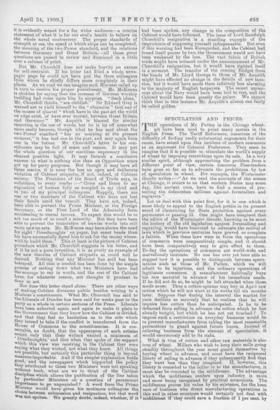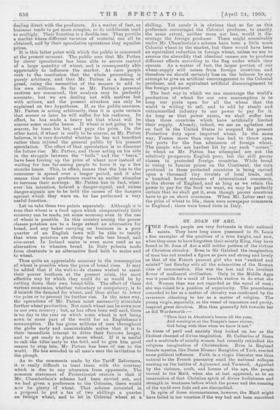SPECULATION AND PRICES.
MHE operations of Mr. Patten in the Chicago wheat- ...11. pit have been used to point many morals in the English Press. Time Tariff Reformers, conscious of the difficulty of finding really substantial arguments for their cause, have seized upon this incident of modern commerce as an argument for Colonial Preference. They seem to imagine that a is possible to stimulate the world's supply ef wheat by imposing restrictions upon its sale. In a very similar spirit, although approaching the problem from a different point of view, certaiu timorous Free-traders have gone so far as to advocate the prohibition by law of speculation in wheat. For example, the Westminster Gazette writes :—" As we read the accounts of the scenes at Chicago, it occurs to us that modern States may some day, like aucient ones, have to find a means of pro- tecting the defenceless millions against forestallers and regraters."
Let us deal with this point first, for it is one which is most likely to appeal to the English public in its present mood of clamouring for State protection against every permanent or passing ill. One might have imagined that the editor of the Westminster Gazette, knowing as he must the history of the old legislation against forestalling and regratiug, would have hesitated to advocate the revival of laws which in previous centuries have proved so complete a failure. When these laws were in force the operations of commerce were comparatively sitnple, and it should have been comparatively easy to give effect to them. To-day the operations of commerce are world-wide and marvellously intricate. No one has over yet been able to suggest how it is possible to distinguish between specu- lations such as those of Mr. Patten, which we will admit to be injurious, and the ordinary operations of legitimate commerce. A manufacturer habitually buys his raw material in advance of his immediate needs. It he did not do so, he might be left stranded when those needs arose. Thus a cotton-spinner may buy in April raw cotton which he will not want at his works till six mouths later. Suppose that during the interval the market for yarn declines so seriously that he realises that he will require less cotton than he anticipated. Is he to be debarred from selling in advance the cotton which be has already bought, but which lie has not yet touched ? To impose such a restriction on everyday business would be to prevent manufacturers from taking the most reasonable precautions to guard against future losses. Instead. of relieving business from the element of speculation, it would enormously add to its risks.
What is true of cotton and other raw materials is also true of wheat. Millers who wish to keep their mills going steadily throughout the year must guard themselves by buying wheat in advance, and. must have the reciprocal liberty of selling in advance if they subsequentky find that they want less than they imagined. If, however, this liberty is conceded to the miller or to the manufacturer, it Must also be conceded to the middleman. The advantage which the middleman confers upon industry is more and more being recognised by practical economists. The middleman proves his value by his existence, for the keen men of business who direct manufacturing operations in this and in other, countries would certainly not deal with Middlemen if they could save a fraction of 1 per cent. by dealing direct with the producers. As a matter of fact, as business tends to get more complex, so do middlemen, tend to multiply. Their function is a double One.' 'They provide a Market where different varieties of material can all be Obtained, and by their speculative operations they equalise prices. It is this latter point with which the public is concerned at the present moment. The public sees that Mr. Patten by clever speculation has been able to secure control of a large quantity of wheat, and is consequently able appreciably to influence the market. At once people rush to the conclusion that the whole proceeding is purely arbitrary, and that Mr. Patten is a demon of greed, using the necessities of the masses to add to his own millions.. So far as Mr. Patten's personal motives are concerned, this analysis may be perfectly accurate; but we are dealing not with motives but with actions, and the present situation can only be explained on two hypotheses. If, as the public assumes, Mr. Patten is acting arbitrarily, then it is quite certain that sooner or later he will suffer for his rashness. In effect, he has made a heavy bet that wheat will be scarcer some months hence. If wheat is not going to be scarcer, he loses his bet, and pays the price. On the other hand, if wheat is really to be scarcer, as Mr. Patten believes, it is very doubtful whether he has not benefited rather than injured the general public by his present specillation. The effect of that speculation is to discount the future rise. Mk. Patten and those acting on his side in the struggle between the "bulls" and the "bears," have been forcing up the price of wheat now instead of waiting for lees far-seeing people to foree it up a few Months hence. This, in effect„ means that the loss to the consumer is Spread over a longer period, and it also Means that wheat producers receive an earlier stimulus to increase their sowings. Mr. Patten has in fact, what- ever his intention, hoisted a danger-signal, and unless danger-signals are to be held the causes of the dangers against which they warn us, he has performed a very useful function.
Let us take these two points separately. Although it is true that wheat is a food upon which comparatively little economy can be made, yet some economy even in the use of wheat is possible. • In this country among the poorer classes potatoes are to a large extent an alternative for bread, and any baker carrying on business in a poor quarter of an English town will be able to testify that when potatoes are cheap he sells less bread, and vice-versa. In Ireland maize is even more used as an alternative to wheaten bread. In Italy polenta made frOm chestnuts is an alternative food both to maize and to wheat.
'Thus quite an appreciable economy in the consumption of, wheat is possible when the price of bread rises. It may be added that if the well-to-do classes wished to assist their poorer brethren at the present crisis, the most effective way by Which they could do so .would be by cutting down their own bread-bills,, effect of these various °cow:Julies, whether voluntary r compulsory, is to dininish the demand for wheat, and thus either to lOwer the price or to prevent its further rise. In the same way, the operations of Mr. Patten 'mint necessarily stimulate fu'rther wheat' production. Not much wheat can be swim now our own country; but as has often been well said, there is'no day in the year On which some wheat is not being sown in some part of the world for an Englishman's consumption. He has given millions of men throughout the globe early and unmistakable notice that it is to their, immediate interest to drive their furrows longer, and to get ready to plant snore wheat. If it is useful to call the tiller early te the field, and to give him good reason to atop late, Mr. Patten has been of use to the world. He has sounded in all men's ears the invitation to the plough.
As to the comments made by the Tariff Reformers, it is really difficult to treat them with the courtesy which is due to any utterance from opponents. The common statement of Protectionist orators • is that if Mr. Chamberlain's scheme had been carried out, and ve ha,l given a preference to the Colonies, there would now be plenty of ,wheat. That scheme consisted in a proposal to put a fax of two shillings a quarter on foreign wheat, and to let in Colonial wheat at a shilling. Yet surely it is obvious that so far as thia preference encouraged the Colonial producer, to exactly the same extent, neither more nor less,. Would it dis- courage the foreign' producer. There might conceivably under Mr. Chamberlain's scheme have been 'a little more Colonial 'wheat in the market, but there Would have been an equivalent reduction in foreign wheat, unless we are to assume the absurdity that identical causes are to produce different effects according to the flag Under which they operate. As a matter of fact, the larger portion of our wheat-supply still comes from foreign countries, and therefore we should certainly lose on the balance by any attempt to give an artificial encouragement to the Colonial producer, and an equivalent artificial discouragement to the foreign producer.
The best way in which we can encourage the world's production of wheat for our own consumption is to keep our ports open for all the wheat that the world is willing to sell, and to add by steady and untrammelled industry to our power to pay for it. As long as that power exists, we shall suffer less than those countries which have artificially limited their supply. Already, indeed, we see an agitation set on foot in the United States to suspend the present Protective duty upon imported -wheat. In time same way, France more than once has had to throw opeu her ports for the free admission of foreign wheat. The people who are hardest hit by any such "corner" in wheat as Mr. Patten has attempted are not the relatively prosperous English poor, but the still, poorer classes in protected foreign countries. While bread is' rising to famine prices on the Continent, the corn produced in these protected countries Is being carried upon a , thousand tiny rivulets of local trade, and a hundred broad streams of international commerce, to the shores of England, and as long as we retain the power to pay for the food we want, we may be perfectly certain that we shall get it, even though poorer countries have to go on short commons. When Mr. Leiter sent up the price of wheat to 50s., there were newspaper comments in England; there were bread riots in Italy.























































 Previous page
Previous page